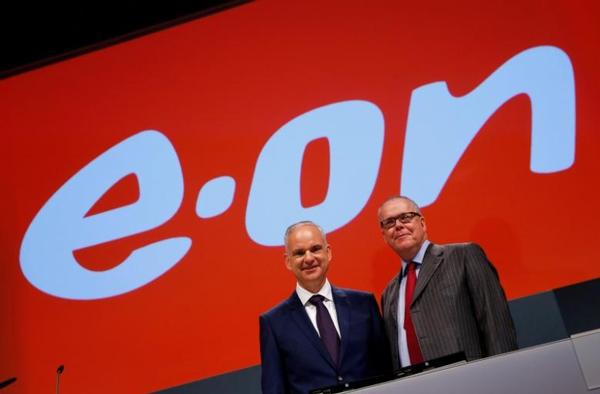German utilities say close to nuclear storage deal
Date: 13-Sep-16
Country: GERMANY
Author: Christoph Steitz, Reinhard Becker and
Ludwig Burger

E.ON Chief Executive
Johannes Teyssen and Klaus Schaefer, CEO of German energy utility
company Uniper SE (R) pose for a picture prior to the annual
shareholders meeting of EON in Essen, Germany, June 8, 2016.
Photo: Wolfgang Rattay
Germany's top utilities said they were nearing a deal with the government over funding for storing radioactive waste, denying a media report that said the cost to the firms of the agreement had risen.
The country's top four energy groups -- E.ON, RWE, EnBW and Vattenfall [VATN.UL] -- are in final talks with Berlin to nail down the details of a deal proposed by a government-appointed commission in April.
Under the plan, the utilities are to transfer 23.3 billion euros ($26.14 billion) in funds to the state, along with responsibility and liability for storing their nuclear waste.
A final deal, which will outline the terms and timing of the payments, is expected within weeks, a spokesman for E.ON said on Monday. "I assume there will be a solution for the four utilities," he said.
A spokeswoman for smaller peer RWE said constructive negotiations with the government were continuing.
Both said a report in daily Boersen-Zeitung, which said the utilities had to transfer 26.4 billion euros of funds, was incorrect.
The paper cited sources close to the commission as saying the final agreed amount included a 35 percent top-up on financial provisioning already set aside by the companies to account for the risk of unforeseen costs in storing the waste safely.
"We don't know these figures and we also think they are inaccurate," the RWE spokeswoman said.
The economy ministry declined to comment on the report, saying it was focused on implementing the proposals made by commission.
Utilities have been fighting for a lower payment, arguing that they have been hammered by plunging power prices, a shift toward renewable energy and Germany's decision to end nuclear power by 2022 following Japan's Fukushima disaster five years ago.
The plan is to use an underground facility - probably a disused mine - to store the waste indefinitely, though the location has yet to be chosen. The decision seems certain to trigger opposition from local residents, and construction of the facility and moving the waste there is expected to take decades.
(Editing by John Stonestreet)
![]()
© Thomson Reuters 2016 All rights reserved